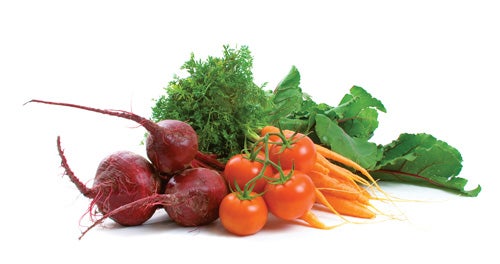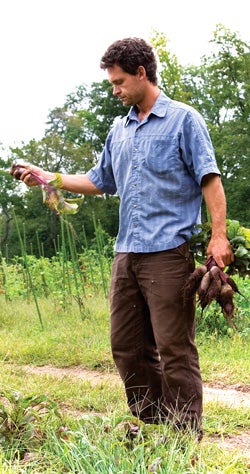A Different Way of Growing Things

We’re all familiar with the old joke “why did the chicken cross the road?” But consider this riddle: “Why do cows lick the road?” Give up?
Well, if you’re Jack Algiere ’99, the answer is simple—but also complex: The cows instinctively understand that their pasture lacks minerals, so licking the road is an attempt to balance their diet. If only humans were as nutritionally intuitive.
“This is a reiteration of the late soil scientist Carey Reams who referred to this observation as the inspiration for his life’s work of relating soil minerals (electromagnetism) to animal and human health,”explains Algiere.
As a farmer, Algiere needs to understand growing things. If the soil isn’t rich in minerals, then the plants aren’t either. If the plants are mineral-deficient, then so are the grazing animals. And if plants and animals aren’t healthy, then people aren’t either.
 Algiere, who holds a degree in turf management and horticulture from URI, has cultivated a wealth of experience working on farms from Rhode Island to Costa Rica, to Colorado to California, to Connecticut and now New York. He can scrutinize with the eye of a scientist and implement with the hands and heart of a farmer.
Algiere, who holds a degree in turf management and horticulture from URI, has cultivated a wealth of experience working on farms from Rhode Island to Costa Rica, to Colorado to California, to Connecticut and now New York. He can scrutinize with the eye of a scientist and implement with the hands and heart of a farmer.
He is now the four season farm manager for Stone Barns Center for Food & Agriculture in Pocantico Hills, N.Y. Based at a former Rockefeller family estate only 30 miles north of midtown Manhattan, Stone Barns is a cutting-edge, not-for-profit operation that is addressing one of the most important challenges facing people today—producing food that is safe, sustainable, and nutritious. Stone Barns Center’s mission is to celebrate, teach, and advance community-based food production and enjoyment from farm to classroom to plate.
Recently Algiere has become a spokesperson for Stone Barns. Media outlets that he has been featured on or interviewed by include WNYC Radio (New York City’s NPR affiliate), WGBH’s Victory Garden, The Today Show, The New York Times, Audubon Magazine, and The Atlantic.
Riding around the farm with Algiere and his steadfast companion, Lily, a working dog who, he says with a laugh, “doesn’t work much anymore,” is an eye-opening experience. Sheep graze in the pastures, pigs root in the forest, and a rolling hill is sprinkled with the remains of a harvested crop of greens. This stunningly beautiful space is a working farm. Algiere proudly shows off the 22,000 square foot greenhouse, the smaller sliding greenhouses that enable crop rotation, and a composter that uses a unique forced-air system that turns post-consumer materials and animal offal (discarded organs) into a nutrient-rich, pathogen-free product that nourishes the soil.
Algiere is entering his seventh growing season at Stone Barns. He came to the attention of Stone Barns Advisory Board member Eliot Coleman, who was heading the search for a four seasons gardener, through the recommendation of organic farming icon Bob Cantisano. Affectionately known as “Amigo Bob,” Cantisano has been involved in the organic revolution since the 1960s. Algiere knew Amigo Bob from his days in California where both men were deeply involved with the Ecological Farming Association.
At the time, Algiere had been working in Lyme, Conn., with his wife, Shannon, who attended URI for two years in environmental science and who has worked alongside Algiere for the past 15 years; the couple have two sons. They were expanding a friend’s family estate vegetable garden into a working organic CSA (Community Supported Agriculture), eventually producing food for 75 member families. “I spent the spring working out details, finished my year in Connecticut, and then transitioned to Stone Barns. We built a half acre greenhouse, and we opened in May 2004,” Algiere recalled.
At this point in Stone Barns growth, Algiere feels that the organization has refined its focus: “We know for ourselves that this is a productive thing, but how do we let others know? We put our heads together about what we do at Stone Barns that is different and valuable. We’re not a research facility, and we’re not about advocacy, although we value both. What is different here is that we are tactile, and we can educate others.”
Thus, Stone Barns is a farm, a kitchen, a classroom, an exhibit, a laboratory, and a campus. It has a multi-level education program. More than 100,000 people, including 7,000 schoolchildren, visit the property each year. There is an ongoing farmer’s market and a variety of educational classes. The celebrated on-site, for-profit restaurant, Blue Hills, works symbiotically with the farm.
Stone Barns has a robust volunteer program and a strong apprentice system. This is crucial given the sharp decline in the number of new farmers. In 1900, nearly 40 percent of Americans farmed full-time; today, less than 1 percent of the population is engaged in growing the food we eat. And most farmers are now over 60 years old. That doesn’t bode well for our future. As fuel costs continue to rise making long-distance food transportation impractical, who will grow our food?
If Algiere has anything to say about it, the answer is close at hand. Local, sustainable, organic and yes, even profitable food production: “The farm has a lot of different values—environmental, social, and monetary. If the farm can’t pay for itself, that’s a problem. If the economics aren’t valued, then the farm won’t be valued.”
Under his direction, Stone Barns grows and harvests approximately 200 varieties of fruits and vegetables in all four seasons, allowing the farm to generate income as well as healthy food year-round. The greenhouses and high tunnels covering crops in the field extend the growing seasons using very little energy aside from what the sun provides.
Algiere thinks these concepts hold the key to our future: “Originally I thought I’d go to school for music. But after working at a greenhouse in Westerly, R.I., my whole view of horticulture changed—I saw it as very pure work.
“As a young, inspired person I had lots of questions, but I was also frustrated because the industrial side of agriculture was so stark. I saw chemical use and weird consumer concepts that were driving food production. I wanted to explore a different way of growing things.”
So maybe that’s why cows lick the road—they’re trying to mootivate us.
—By Jennifer Sherwood ’89
 Home
Home Browse
Browse Close
Close Events
Events Maps
Maps Email
Email Brightspace
Brightspace eCampus
eCampus


